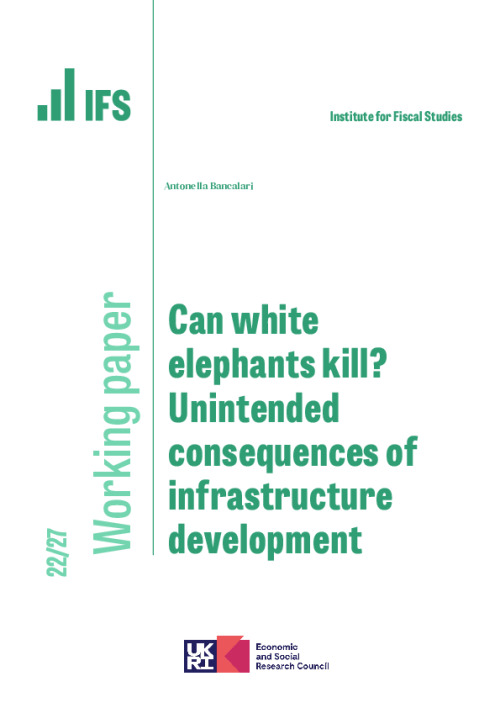Downloads
I provide evidence of the severe social costs imposed by infrastructure projects that are being implemented (i.e., projects started but not yet completed) in the context of sewerage in Peru. Using a counterfactual implementation predicted from geography-based cost considerations as an instrument, I show that implemented projects increase infant and under-five mortality. These results are driven by hazards, poor hygienic conditions and unsafe behavior, which increase deaths by waterborne diseases and accidents. Delays and mid-construction halting are common, and exacerbate the lethal effects of projects. Failing to take the implementation phase into account could severely bias the welfare evaluation of infrastructure.
Authors

Senior Research Economist
Antonella Bancalari is a Senior Research Economist at the Institute for Fiscal Studies.
Working Paper details
- DOI
- 10.1920/wp.ifs.2022.2722
- Publisher
- Institute for Fiscal Studies
Suggested citation
Bancalari, A. (2022). Can white elephants kill? Unintended consequences of infrastructure development. London: Institute for Fiscal Studies. Available at: https://ifs.org.uk/publications/can-white-elephants-kill-unintended-consequences-infrastructure-development (accessed: 30 June 2024).
More from IFS
Understand this issue

Conservative Party Conference: Can the next government afford the NHS?

Liberal Democrat manifesto: a reaction
10 June 2024

Retirement is not always a choice that workers can afford to make
6 November 2023
Policy analysis

How do the last five years measure up on levelling up?
19 June 2024

A response to the Conservatives’ proposals to reduce growth in the health-related benefits bill
8 June 2024

The past and future of UK health spending
14 May 2024
Academic research

The role of hospital networks in individual mortality
13 May 2024

Targeting men, women or both to reduce child marriage
28 May 2024

Keeping the peace whilst getting your way: Information, persuasion and intimate partner violence
17 May 2024
